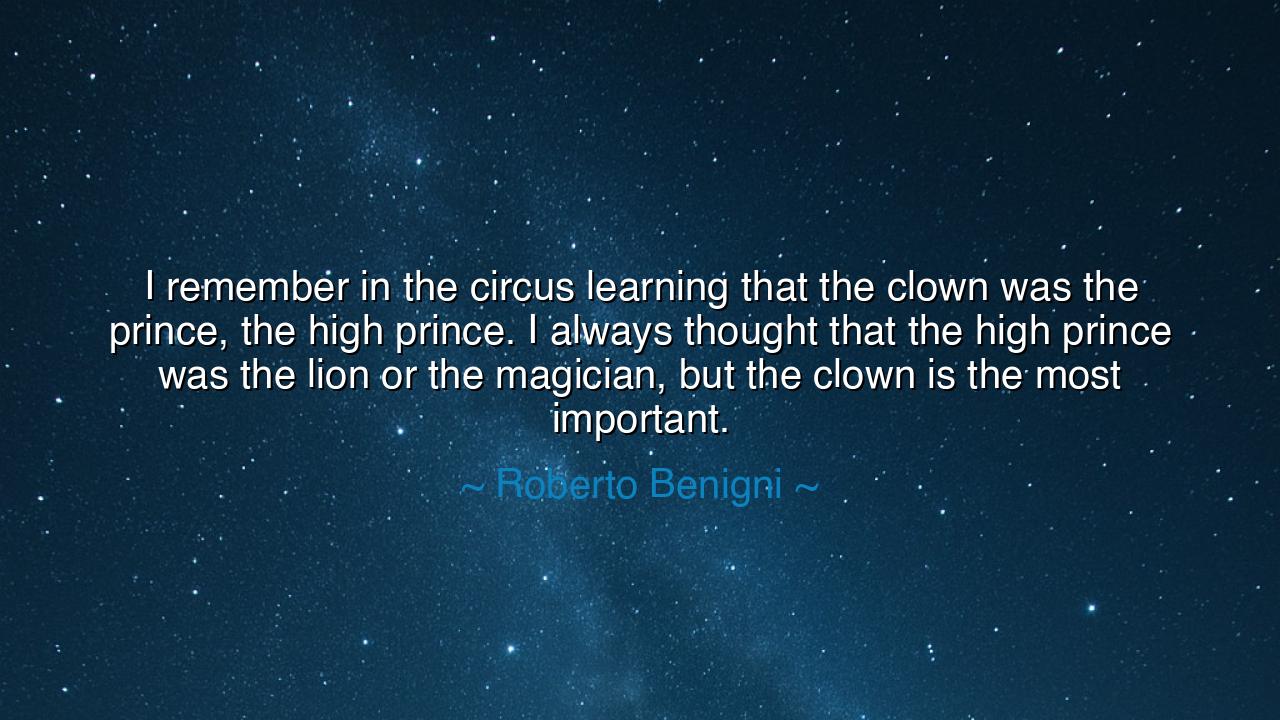
I remember in the circus learning that the clown was the prince
I remember in the circus learning that the clown was the prince, the high prince. I always thought that the high prince was the lion or the magician, but the clown is the most important.






In a voice at once tender and full of wonder, Roberto Benigni once said, “I remember in the circus learning that the clown was the prince, the high prince. I always thought that the high prince was the lion or the magician, but the clown is the most important.” These words, seemingly light as laughter, carry within them the weight of revelation. For Benigni, whose art has always walked the line between comedy and tragedy, this realization was not about the circus alone—it was about life itself. In this reflection, he unveils a paradox as ancient as joy and sorrow: that the one who makes others laugh is often the one who suffers most deeply, and that in laughter lies a quiet kind of nobility.
The origin of the quote is rooted in Benigni’s own childhood and artistic philosophy. Growing up in Italy, he was enchanted by the traveling circuses that passed through the countryside—the lions roaring in their cages, the magicians conjuring illusions, and the clowns, those strange figures who turned falls into triumphs and tears into delight. Later, as an actor and director, Benigni would embody this truth in his most famous work, Life Is Beautiful, where he played a father using humor to shield his son from the horrors of war. Through the eyes of the clown, he discovered that laughter is not the opposite of pain, but its antidote. The clown, he learned, is not a fool, but a healer—the “high prince” who bears the crown of compassion.
In ancient times, philosophers and poets understood this same mystery. The Greeks revered comedy as the twin of tragedy, believing both to be divine gifts that revealed the nature of the human heart. The wise playwright Aristophanes, through laughter, challenged tyranny and hypocrisy, while Socrates himself was known for his irony—a humor that disarmed arrogance and opened the soul to truth. Even the jesters of medieval courts held a sacred role. Though clothed in rags and bells, they were allowed to speak truth to kings, for laughter could reach where power could not. Thus, as Benigni says, the clown is indeed the prince—not of wealth or might, but of insight and mercy.
The clown, in his essence, is the mirror of humanity. He stumbles, he weeps, he pretends to fail—but in his failure, we see our own. His foolishness gives us permission to forgive ourselves. The lion may embody strength, and the magician illusion, but the clown embodies truth. He stands at the center of the ring, not to display power, but to reveal humility. In the flicker of his smile, the world remembers that joy is a weapon against despair, and that the heart which can laugh at itself is unbreakable.
Consider the story of Charlie Chaplin, who, like Benigni, wore the mask of laughter to speak of suffering. Born in poverty, raised amid hardship, Chaplin created the “Little Tramp,” a character both comic and tragic, a wanderer who faced cruelty with grace and hunger with humor. Through his art, Chaplin reminded millions that dignity survives even in rags. He, too, was a prince of the circus—the sovereign of simplicity, whose throne was the human spirit. Like Benigni, he showed that the power of the clown lies not in mockery, but in love—the courage to smile when the world frowns.
When Benigni calls the clown “the most important,” he is not merely praising performers—he is offering a vision of leadership rooted in humility. The true prince, he teaches, is not the one who commands, but the one who uplifts; not the one who dazzles, but the one who heals through laughter. The clown becomes a symbol of divine paradox: strength through vulnerability, wisdom through foolishness, light through tears. In the laughter he brings, there is redemption—the reminder that even in the darkest tents of life, the human soul can dance.
Let this be the lesson to all who hear it: do not despise the fool, for he is the guardian of wisdom. Be not ashamed of laughter, for it is the echo of resilience. In a world that worships power, dare to be the clown—the one who brings light, who lifts hearts, who turns sorrow into song. There is no higher calling than to bring joy to others, no greater nobility than to ease their pain with a smile.
For as Roberto Benigni discovered beneath the striped tent of his youth, the clown is not the lowest servant of the circus—he is its crown, its beating heart. He teaches us that the greatest courage is not in the roar of the lion or the trick of the magician, but in the quiet, trembling laughter that says: “Even in suffering, I will shine.” And so, the clown, the “high prince,” stands as a timeless emblem of love triumphant over despair, joy rising from sorrow—the laughter of the human soul, undefeated.






AAdministratorAdministrator
Welcome, honored guests. Please leave a comment, we will respond soon